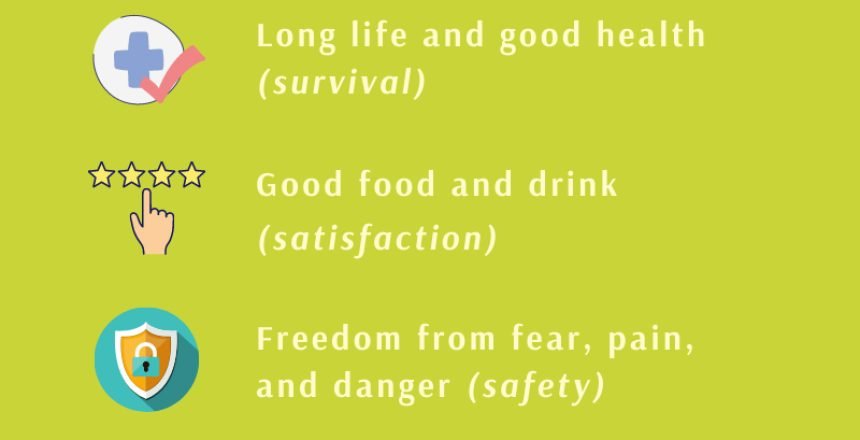If you had to answer this question right now, what would you say? What do you want out of your life? We all have a vague idea about how we want our lives to look, but few of us really get down to the nuts and bolts of defining what the most important things are. We know we can’t have it all, but we don’t want to settle for a mediocre life. So, what things would make your life good, better, or even best?!
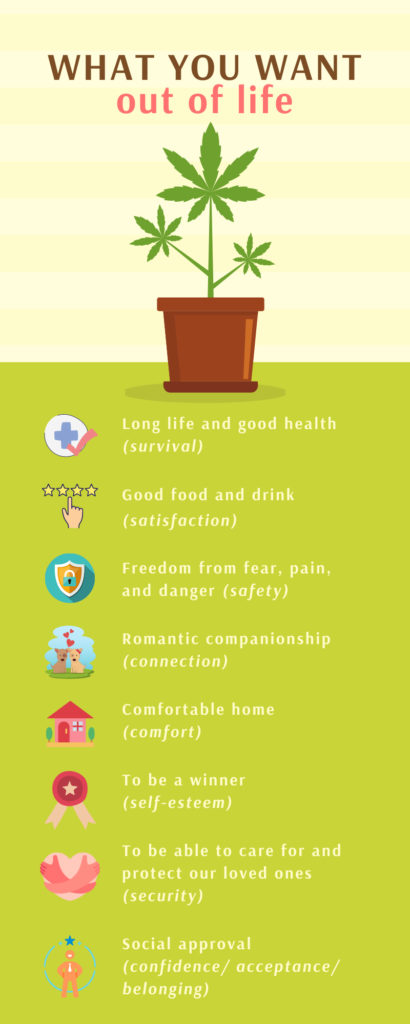
Most people, when it gets right down to it want nearly the same eight things from life:
- Long life and good health (survival)
- Good food and drink (satisfaction)
- Freedom from fear, pain, and danger (safety)
- Romantic companionship (connection)
- Comfortable home (comfort)
- To be a winner (self-esteem)
- To be able to care for and protect our loved ones (security)
- Social approval (confidence/acceptance/belonging)
Believe it or not, when thousands of people are polled, money isn’t even on most lists. Maybe we are smart enough to realize that money can’t save the soul or soothe the heart. It’s just a tool to get some of the other things on the list. Ultimately, we must put health and wellness first, because without that we can’t enjoy any of the other things. What good is food and drink if you are too sick to enjoy it or keep it down? I know people with colitis who can’t even keep water down without cramping. Chemotherapy patients are constantly struggling with nausea and appetite. Some people are so anxious they have no appetite. No one really escapes fear, pain, and danger because it is all around us. This past year the Coronavirus malarkey has shown that there is no escaping fear, pain, and danger! A virus that can’t be seen with the naked eye has taken out (as of this writing) more than a million people worldwide. Does anyone really feel safe anymore? Do masks work or not? Will a vaccine work or not? No one knows the answers to these things. Not knowing feels unsafe.
Most people spend their lives either trying to get into a romantic relationship or trying to get out of one they are already in. The human heart is a fickle mistress. What good is having a romantic relationship if you can’t make it last? People who are sick, in pain, and unstable emotionally have a harder time maintaining healthy romantic relationships.
To be a winner is to excel at something you want to excel at. Winning doesn’t always make one a winner. Think of all the famous and rich people in the world who are mired in addiction, battling bouts of depression, and who die early often by self-inflicted injury. Being a winner is all about attitude, not about money, fame, or beauty.
The desire to care for and protect our loved ones is noble. Some of the world’s most heroic men and women are those who are caring for and protecting those who need it most — the elderly, children, the infirm, and those with chronic physical or mental illness. How much better would it be for them if they had an answer for their loved ones’ problems or a balm to ease their suffering?
Social acceptance may seem shallow on the surface, but we humans are tribal by nature. Our DNA is hardwired for community and sociability, so being accepted socially is more than just an ego trip, it is the assurance that we are somehow part of a tribe and can benefit from membership in that tribe.
You may have other items on your list of what you want out of life, but for now, let’s just explore these basic eight desires and see if Cannabis can help with any of them, shall we?
ENJOYING FOOD AND DRINK
Patients with digestive issues, cancer, HIV-related anorexia, and chronic pain all struggle with appetite. In fact, anytime we are sick our appetite suffers. Mealtimes can be distressing, but so can weight loss and decreased immune function from not getting nourishing food. THC, one of the active compounds in Cannabis boosts appetite by altering the chemicals in the brain for a period of time. In a way, Cannabis tricks the brain into feeling hunger which helps those struggling get the nourishment they need to get stronger and heal. It does this by slowing down or inhibiting the production of Leptin — commonly known as the satiety hormone or the “I feel full hormone.”
Cannabis also helps with the enjoyment of food, making it taste better and feel more satisfying. Food aversions are common when someone is sick. If they have thrown up after eating a certain food, they will have an aversion to it. Sometimes they just can’t eat certain foods because those foods seem “too heavy” to keep down. Research shows that manipulating the endocannabinoid system with Cannabis therapy activates CB1 receptor sites which prevent food aversions.
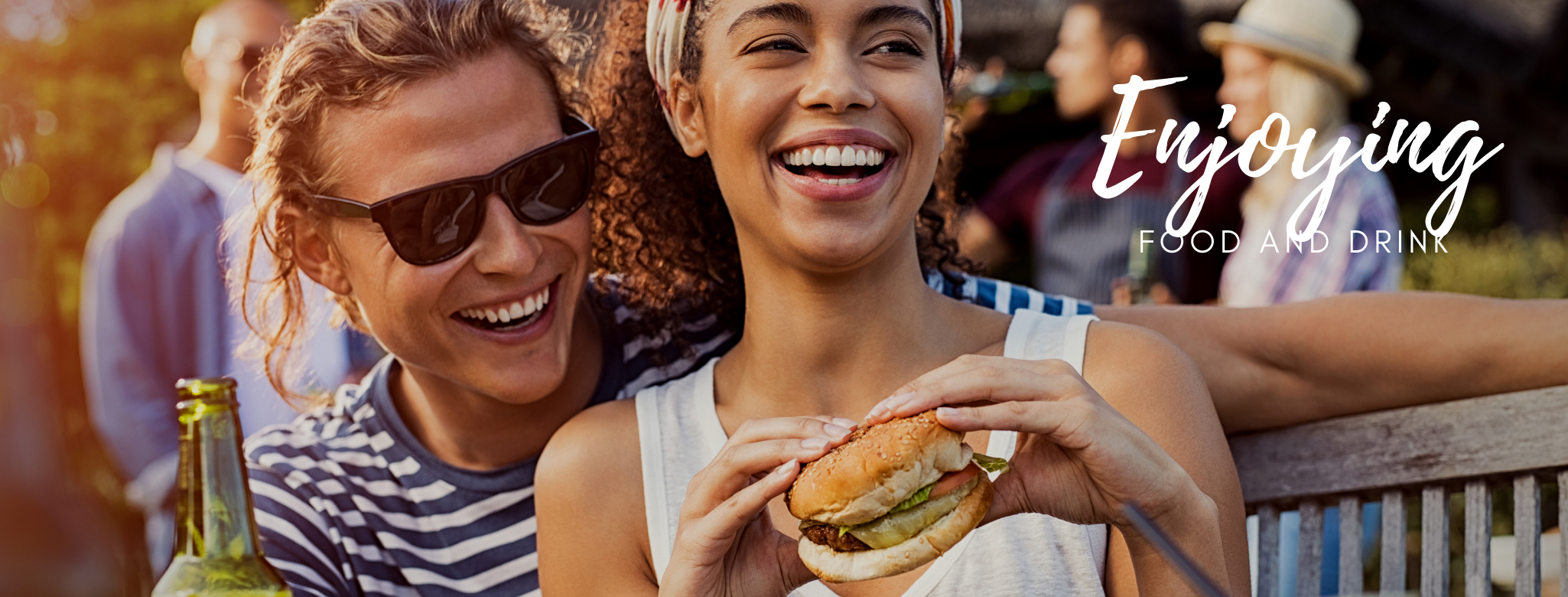
FREEDOM FROM FEAR, PAIN, AND DANGER
In a famous speech, Franklin Delano Roosevelt told us that “We have nothing to fear but fear itself.” This speech was given on a very scary day after the bombing of Pearl Harbor at the onset of the Second World War. Truly, our fear and the stress response that follows it is one of the most dangerous things we encounter daily. The
medicinal effects of Cannabis with all its healing cannabinoids, terpenes, and flavonoids are a recognized source of treatment for and relief from anxiety, depression, stress, and PTSD.
What is PTSD exactly? Those who struggle with this condition often feel stressed and in danger when there is no real threat. PTSD is at its core a dysregulation of the stress response in the human body — also called “HPA-axis dysfunction.” When the “fight or flight” mechanism in the brain is stimulated too severely, or too often by trauma or hypervigilance, it becomes “hair-trigger” and any little event can bring on a full-blown panic attack. The Hypothalamus part of the brain (H) tells the Pituitary gland (P) to tell the Adrenals (A) to shoot forth cortisol, adrenaline, and other stress hormones to get you ready to fight a tiger or run away from it! Unfortunately, most of the time these are “paper tigers” and the stress response itself is what needs to be regulated. Cannabis can help with this!
CBD and THC can help people with PTSD by prompting the nervous system to produce neurotransmitters that help promote happiness, pleasure, and memory. One study shows that people who suffer from PTSD have much lower levels of a neurotransmitter called anandamide, a natural antidepressant. This neurotransmitter is produced and regulated by the endocannabinoid system in the body — the system in charge of moods, happiness, fear, and anxiety. The lead author of this study says that people with PTSD often experience more relief from their symptoms with Cannabis use than they do with antidepressants or anti-anxiety medications. In addition, it appears from research that targeting the endocannabinoid system successfully treats haunting, traumatic memories.
Pain is something most humans try to avoid at all costs. We know pain is a part of life, but we don’t really want to experience it if we don’t have to. Unfortunately, for those struggling with chronic health problems, pain is an ever-present companion. But is that really unfortunate? Is pain the true enemy? Pain (believe it or not) is a great gift—given as a warning that something is going on in your brain and your body that needs to be addressed. When we begin to see pain as a natural, normal, and necessary physiological response, we can start to address the underlying issues instead of just treating the symptom of pain. More than 47,000 persons died from opiate overdoses just last year — many of them struggling with the chronic pain of PTSD.iv Where Cannabis is legal, there are many alternative healers who understand the stress response and its role in chronic pain and are able to help you navigate healing.
Dr. Peter Levine has worked in the field of trauma and pain for more than forty years. He devised a method of treatment called the Somatic Experiencing Method. This method begins with the premise that when the body gets “stuck” in the stress response, the body and brain constrict, becoming rigid and stuck in that dark place.v Painful conditions like fibromyalgia, irritable bowel syndrome, and migraines can be caused or made worse by being stuck in the stress response. When you break that response and rewire those circuits that run between the vagus nerve in the gut and the brain, only then will you begin to experience relief without harmful and addictive drugs.
Cannabis has been used all over the world throughout history for medicinal purposes, not the least of which is pain relief. The Chinese have records of use for a variety of conditions and symptoms from around 2900 B.C. Today people all over the world are using Cannabis for pain relief. This is a big deal for a couple of reasons — being out of pain or having a reduction in pain can be life-altering for chronic pain sufferers; and the possible reduction in habit-forming and dangerous opioid consumption for pain is a win-win. Pain relief is the most cited reason for the medical use of Cannabis.
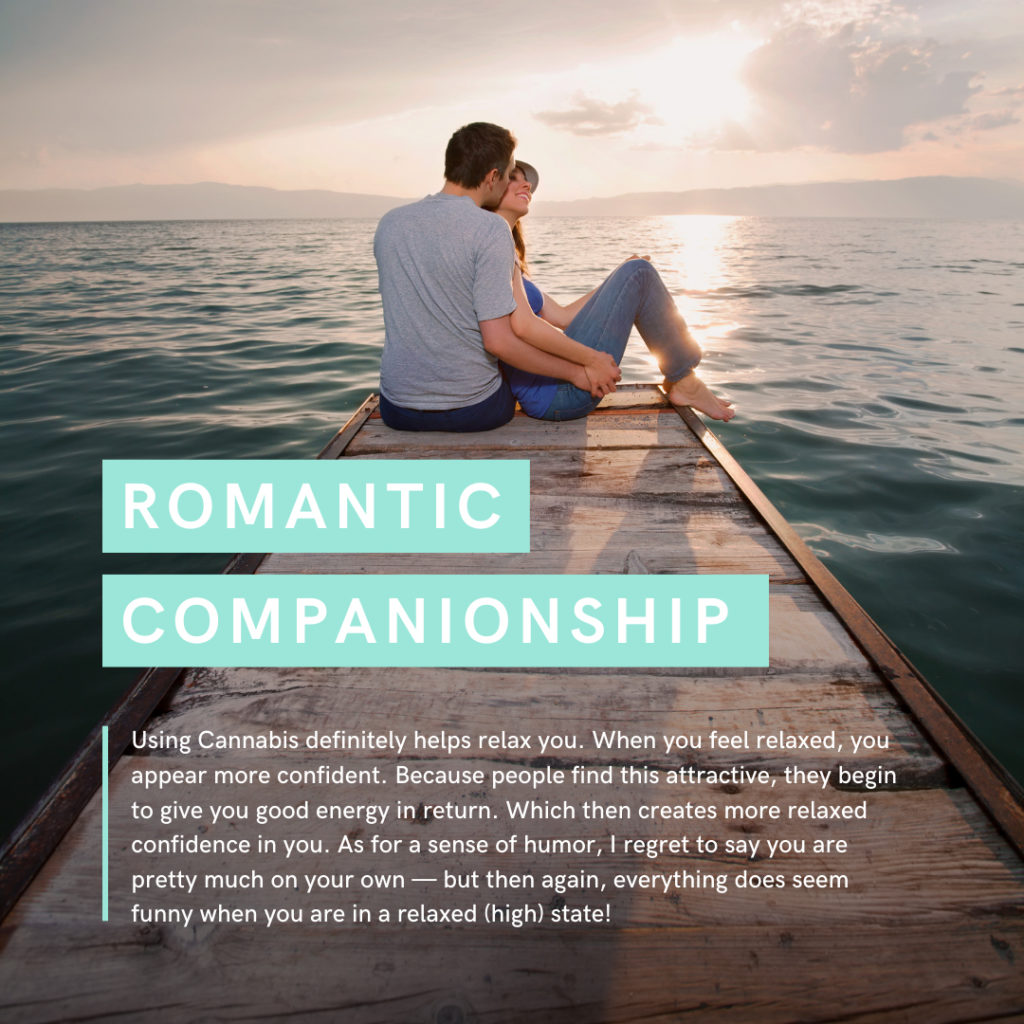
ROMANTIC COMPANIONSHIP
This isn’t a television ad. I’m not going to sit here and tell you that if you light up you will find the love of your life. But think about all the wisdom you have heard or read over the years about true love. We attract others because of who we are — because of the energy that we radiate. We all know those people who aren’t drop-dead gorgeous, but they light up the room when they walk in. Everyone wants to know that person or be that person. What makes a person attractive? Most polls say that positivity, relaxed confidence, and a genuine sense of humor are the most desirable qualities. Using Cannabis definitely helps relax you. When you feel relaxed, you appear more confident. Because people find this attractive, they begin to give you good energy in return. Which then creates more relaxed confidence in you. As for a sense of humor, I regret to say you are pretty much on your own — but then again, everything does seem funny when you are in a relaxed (high) state!
BEING A WINNER
No one ever started life out as a loser. Think about it. It’s only after we’ve been knocked around a bit, fallen down a few times, and suffered hurt and heartache that we begin to question our ability to get back up to the plate and swing the bat. If you had to narrow down all the qualities of a winner to one brief statement, it would be that winners see the good in themselves and others. Winners are positive. They focus on possibilities, not on problems.viii When was the last time you felt like you could do this? When you are sick you are usually also in pain. When in this state, you don’t have the energy to be positive and look for possibilities. All you can see are the problems staring at you. Cannabis can help with this aspect of life too!
Since the endocannabinoid system plays a huge role in mood regulation, it’s an easy deduction that it can help you have a more positive outlook on life. In addition, the pain relief and healing properties it brings to the table can be part of a multi-faceted healing plan. When added to a nutrient-dense diet, regular functional movement and exercise, and regular detoxification practices, Cannabis truly can provide that winning edge we all long for.
CARING FOR AND PROTECTING OUR LOVED ONES
I’m not sure there is anyone who feels as helpless and hopeless as a parent who is forced to choose between watching their child have uncontrollable seizures or watching them become a zombie with the prescription medication for the seizures. Other neurological diseases and cancers in children devastate the parents and make them feel completely powerless.
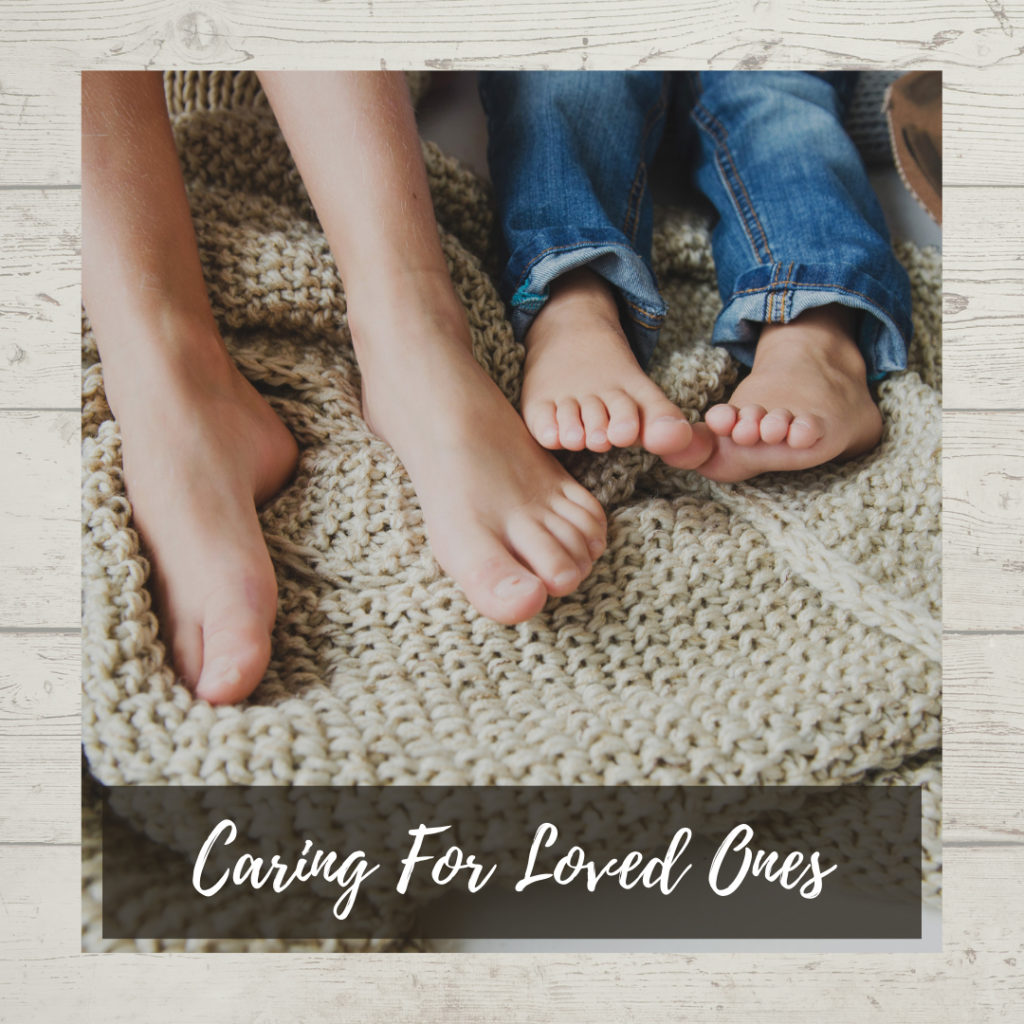 With the acceptance of medical marijuana for children, parents now have something to fight back with. They can care for and protect their children from the
With the acceptance of medical marijuana for children, parents now have something to fight back with. They can care for and protect their children from the
harsh side effects of disease conditions or the treatments for those conditions (like chemotherapy and radiation). Sleep is attainable where once it was not. Pain is reduced. The playing field is leveled. For the future, more effective pharmaceutical developments can occur because of the discovery of specific receptors and natural ligands in the body that make Cannabis effective at balancing the body and putting it into homeostasis — that place of balance and rest where true and lasting healing takes place.
SOCIAL ACCEPTANCE
It may seem superficial to some to desire social acceptance, but connection is not optional. Our brains were wired for connection to others! In 1997, researchers at Washington University published two papers in the Journal of Cognitive Neuroscience showing that connection is the “default” network that our brains revert to when they are not actively engaged in another project!x They showed that the default network of connection doesn’t come on like a reflex. It’s actually the brain’s preferred state of being — one it returns to literally the second it has a chance.
One recent study showed that loneliness triggers parts of the brain normally associated with physical pain. It can actually cause your brain to believe you are in
physical pain because a key antiviral response driven by Type 1 interferon molecules is suppressed in lonely people. In addition, there is another block of genes that is greatly activated. These are the genes involved in inflammation that leads to physical pain.xi You may be so numb or depressed that you can’t feel the loneliness but trust me when I say that if you are not connected to at least a couple of other humans who “get” you, or who provide safe refuge for your soul, then you ARE lonely. And that chronic pain you suffer with? It may be your body’s way of telling you that your heart and your mind are lonely. Social isolation takes a toll on the body.xii
One of the greatest things about the Cannabis community is just that — it’s a community! It is filled with good people, many of whom have overcome tremendous obstacles with the help of medical marijuana. They have a core understanding of the power of Cannabis to heal the body, and they are tireless and selfless in their support of others in the community. They work towards a common goal, and that is to spread the truth that anything found in nature should not be illegal — especially when it makes life so much better for so many people in so many different ways.
- ii https://echoconnection.org/post-traumatic-stress-disorder-ptsd-medical-cannabis-and-cbd-research-overview/
- iii Akirav, I. (2013). Targeting the endocannabinoid system to treat haunting traumatic memories. Frontiers in Behavioral Neuroscience, 7, 124. Retrieved from http://www.ncbi.nlm.nih.gove/pmc/articles/PMC3776936/.
- iv https://www.sharecare.com/health/substance-abuse-addiction-recovery/how-many-people-addicted-painkillers
- v http://www.drjoetatta.com/tag/connections-between-trauma/? inf_contact_key=a9a57c555ca8b2e600591a0ef409dffdb50f98db188d0466a109d11f219b9c70
- vi https://www.liebertpub.com/doi/full/10.1089/can.2017.0017
- vii https://www.mentalfloss.com/article/527752/8-traits-people-find-attractive-according-science
- viii https://www.radiotoday.com.au/what-makes-a-winner/
- ix Lieberman, Matthew D. Social: Why Our Brains Are Wired to Connect.” New York, Random House, 2013.
- x Ibid., page 16.
- xi http://newsroom.ucla.edu/stories/stories-20161206
- xii https://www.ncbi.nlm.nih.gov/pubmed/20417589


